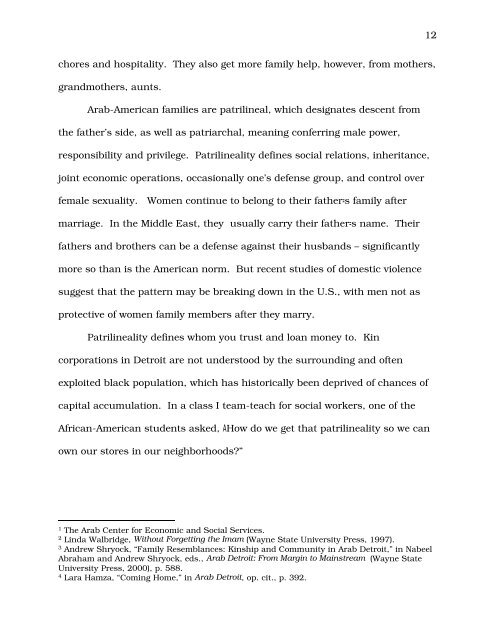Family, Gender, and Community Organization - Woodrow Wilson ...
Family, Gender, and Community Organization - Woodrow Wilson ...
Family, Gender, and Community Organization - Woodrow Wilson ...
- No tags were found...
Create successful ePaper yourself
Turn your PDF publications into a flip-book with our unique Google optimized e-Paper software.
12chores <strong>and</strong> hospitality. They also get more family help, however, from mothers,gr<strong>and</strong>mothers, aunts.Arab-American families are patrilineal, which designates descent fromthe father’s side, as well as patriarchal, meaning conferring male power,responsibility <strong>and</strong> privilege. Patrilineality defines social relations, inheritance,joint economic operations, occasionally one’s defense group, <strong>and</strong> control overfemale sexuality. Women continue to belong to their father=s family aftermarriage. In the Middle East, they usually carry their father=s name. Theirfathers <strong>and</strong> brothers can be a defense against their husb<strong>and</strong>s – significantlymore so than is the American norm. But recent studies of domestic violencesuggest that the pattern may be breaking down in the U.S., with men not asprotective of women family members after they marry.Patrilineality defines whom you trust <strong>and</strong> loan money to. Kincorporations in Detroit are not understood by the surrounding <strong>and</strong> oftenexploited black population, which has historically been deprived of chances ofcapital accumulation. In a class I team-teach for social workers, one of theAfrican-American students asked, AHow do we get that patrilineality so we canown our stores in our neighborhoods?”1The Arab Center for Economic <strong>and</strong> Social Services.2Linda Walbridge, Without Forgetting the Imam (Wayne State University Press, 1997).3Andrew Shryock, “<strong>Family</strong> Resemblances: Kinship <strong>and</strong> <strong>Community</strong> in Arab Detroit,” in NabeelAbraham <strong>and</strong> Andrew Shryock, eds., Arab Detroit: From Margin to Mainstream (Wayne StateUniversity Press, 2000), p. 588.4Lara Hamza, “Coming Home,” in Arab Detroit, op. cit., p. 392.
















